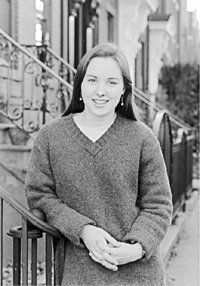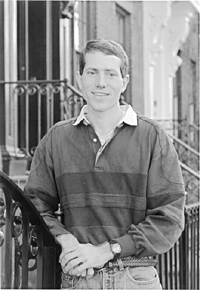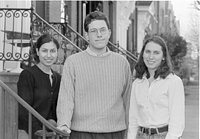After her interview before a Marshall Scholarship committee, Anisha Dasgupta felt nearly certain that she would not be selected for the prestigious award.
"It was traumatic," says the Yale senior, reflecting on her interview. "It was one of the worst experiences of my life. I had met some of the people who were interviewed before and after me and they seemed very composed and articulate. They described their interviews as very conversationalist. I was very nervous, and the committee just kept asking me one question after another until the end, when it became more of a conversation. By the time it was over, I had given up all hope of winning the award."
Having heard that winners would be announced on the Monday following her interview, Dasgupta was fully convinced by midnight that day that she was out of contention. At 1 a.m. on Tuesday morning, however, she received a call announcing she had won. "I was up drinking caffeine and writing a paper," she says. "Between the caffeine and my adrenaline, I ended up awake all night after I heard the news. I was ecstatic."
Dasgupta is one of three Yale seniors who just received news that they have won Marshall Scholarships. The other Marshall Scholars are Andrew B. Cohen and Jillian M. Cutler.
Also taking time out of end-of-semester studying to celebrate are senior Siobhan K. Peiffer and first-year Law School student Jeffrey Manns, who are among the 32 American students selected as winners of the coveted Rhodes Scholarships. Recent Yale graduate Cary C. Franklin '98 also won the award.
Typically drawing more than 1,000 applications each year, the Rhodes Scholarships support up to three years of study at Britain's Oxford University. The award was established in 1902 by the will of Cecil Rhodes, a British colonial financier and entrepreneur, and is given to students who have distinguished themselves both academically and outside of the classroom.
Siobhan K. Peiffer. For Siobhan Peiffer, the scholarship will allow her to pursue her long-time interest in literature and poetry. She plans to study literature from the period of 1880 to the present at Oxford University with the goal of earning a M.Phil. degree.
Though the application process was long and "very intense," Peiffer says she was helped somewhat by the training she has received as a member of the Yale Debate team, through which she has polished her oratory skills, and by focusing her application on subjects in which she is keenly interested: literature and writing.
"I wrote my essay on the importance of literature and the discipline of writing," says Peiffer, an English major who notes that her "first love" is poetry.
Since freshman year, Peiffer has worked for the weekly student newspaper the Yale Herald, for which she has been a writer, arts editor, editor and editor-in-chief. She is now a senior editor for the publication. In addition, she has taught math and English to middle school students through the U.S. Grant Foundation, a program for motivated but economically disadvantaged New Haven schoolchildren, and has been a tour guide for the University's Visitor Information Center. She is also a member of the Yale Glee Club.
Peiffer is a member of Jonathan Edwards College and comes from Southhampton, New York.
Jeffrey Manns. While he was ecstatic to hear that he won the Rhodes Scholarship, Jeffrey Manns admits his triumph also has a "bittersweet angle" to it. "Now that I've just made new friends and have gotten adjusted to life at the Law School, I'll be away from it for a time," he explains.
Describing his application for the scholarship as a "crazy gamble," Manns is nonetheless very excited to have the chance to study international relations and law at Oxford, where he expects to earn either a M.Phil. or D.Phil degree. After two or three years at Oxford, he will return to Yale to complete work for his law degree.
"By the time I'm done, I'll have a good legal/academic background," says Manns. "I'm fascinated by the foreign policy-making process and will have the opportunity to focus on that."
Manns, who is from Wynnewood, Pennsylvania, graduated last year from the University of Virginia, where he was first in his class. There, he headed a model United Nations' conference, was editor-in-chief of a monthly opinion publication called The Virginia Advocate and a columnist for the school's daily newspaper. He also tutored English-as-a-Second-Language and was captain of a club running team. Since coming to Yale, he has been active in Christ Presbyterian Church and a group for Christian law students, and works on the Yale Journal of International Law and the Yale Journal of Regulation.
Winning the Rhodes Scholarship, says Manns, confirms the ethic that his family taught him: "If you work hard at things, they will work out."
Cary C. Franklin. Cary Franklin, who hails from Avon, Connecticut, currently works at Houghton Mifflin publishing company in Boston. She graduated summa cum laude with a double major in English and history, with distinction in both majors. The Marshall Scholarship caps a long list of undergraduate prizes for the alumna. At Commencement, she was a co-recipient of the Warren Memorial High Scholarship Prize, which is given to the senior majoring in the humanities who ranks highest in scholarship. Her other honors include the Chauncey Brewster Tinker Prize, given to an outstanding senior in English, the Ralph Payne Memorial Prize for the best senior essay in English and the Winifred Sturley Prize for best senior essay on a topic in English history.
While at Yale, Franklin designed and conducted children's tours and activities at the Yale Center for British Art and was poetry editor of the Yale Daily News Magazine. She was also a legal assistant at the Legal Aid Association in New Haven and was a volunteer in the city's Life Haven Soup Kitchen.
At Oxford, Franklin will continue investigations she began as an undergraduate on the intersection of politics and aesthetics, specifically through a study of an early 20th-century feminist literary journal called the Freewoman. After earning a M.Litt. degree, she intends a career in law.
Considered -- like the Rhodes Scholarship -- as one of the highest undergraduate accolades, Marshall Scholarships support the cost of study in the United Kingdom for up to three years. In addition to academic distinction, Marshall Scholars are considered likely to become leaders in their field and make a contribution to society. The award was established in 1953 by the British Parliament as a gesture of thanks to the American people for assistance received from the Marshall Plan after World War II.
Andrew B. Cohen. After sending in his application for a Marshall Scholarship, Andrew Cohen kept reminding himself that the odds were against his winning the prestigious award. "Everybody is very honest about that fact," says Cohen. He was immensely surprised when he heard that he had won. "It's wonderful; I'm just thrilled, and all the more so because I really didn't expect it," says the Branford College student.
An English major, Cohen will use his Marshall Scholarship to study Renaissance poetry at Oxford, and looks forward to being at school abroad.
At Yale, he has been engaged in community service as a coordinator of the Young Israel Soup Kitchen at the Joseph Slifka Center for Jewish Life at Yale and has tutored elementary schoolchildren at New Haven's Prince School as a volunteer for the TIES (Tuturing in Elementary Schools) program. He also is a recreational runner and member of the Branford College intramural running team.
Cohen is relieved that the competition for the scholarship has come to an end. "It was a long and strange process," says Cohen, who is from Chapel Hill, North Carolina. "During the interview, I felt as though I was taking an oral exam in English literature. They also asked me to translate two passages in Latin and to read a poem. As prepared as I felt in certain respects, the interview wasn't quite what I expected."
But his answers and performance during the interview "must have been okay," Cohen adds. "The news that I won is still sinking in."
Jillian M. Cutler. Unlike Cohen and Dasgupta, Jillian Cutler found her interview experience less nerve-wracking than she had anticipated, she says. "I had heard so much about it and how challenging it can be," the Yale senior comments, "but it was more pleasant than I had expected."
With her award, Cutler intends to earn a second B.A. in political science and sociology at Cambridge University, where she will focus on an examination of social policy from an interdisciplinary perspective. "I'm interested in looking at the experiences of individuals as they have been affected by social policy, such as welfare and other programs," says Cutler, who is a member of Calhoun College. Her trip to England will be her first time abroad.
Cutler's other future aspirations include law school, after which she hopes to be involved in disability rights law and advocacy. She has already proven her commitment to such advocacy as an undergraduate: last year, she founded the group Students for Disability Awareness. Her other activities include volunteering for the undergraduate tutoring program Youth Together, through which she works at Roberto Clemente Middle School. In May she will receive her B.A. in American studies. Cutler hails from Bethesda, Maryland.
Anisha S. Dasgupta. A humanities major at Yale, Anisha Dasgupta will use her Marshall Scholarship to attend Cambridge University, where she plans to earn two degrees: a M.Phil. in social and economic history, with a focus on medieval history, and a Ph.D. in economic history. Ultimately, she'd like to teach medieval and economic history.
Had history been the focus of the questions she was asked by the Marshall committee, Dasgupta says she might have felt more comfortable. Instead, she was queried in detail about foreign policy and current events.
"Luckily, I do read the newspaper and a few other publications that keep me somewhat abreast of current events," Dasgupta says. "I just winged it."
Her extracurricular activities include serving as a freshman counselor in her residential college, Timothy Dwight (TD); tutoring at Careways, a New Haven domestic violence shelter; and serving as undergraduate secretary for the Elizabethan Club and as a member of the Dean's Advisory Committee for Course of Study. In addition, she is a member of the Yale International Relations Association and works both as a research assistant for Yale law professor Steven Duke and as the residential college seminar coordinator for TD.
Dasgupta is from Briarcliff Manor, New York.
Rhodes Scholars
Marshall Scholars

 PHOTO BY MICHAEL MARSLAND
PHOTO BY MICHAEL MARSLAND
Jeffrey Manns
Anisha S. Dasgupta, Andrew B. Cohen, and Jillian M. Carter

 PHOTO BY MICHAEL MARSLAND
PHOTO BY MICHAEL MARSLAND

 PHOTO BY MICHAEL MARSLAND
PHOTO BY MICHAEL MARSLAND